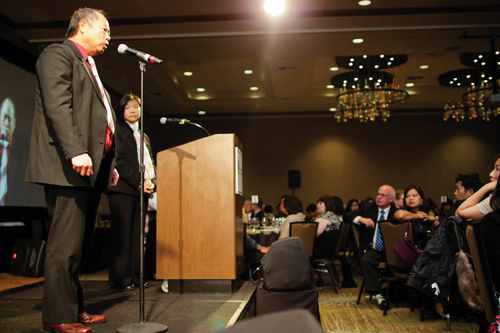By Assunta Ng
Northwest Asian Weekly

David Ma on stage at the Asian Counseling and Referral Service benefit gala.
In contrast to the star chefs’ demonstrations at the Asian Counseling & Referral Service benefit gala on Oct. 6, David Ma walked onto the stage without any fanfare. But, despite this, the first words he spoke caught the audience’s attention. He revealed his 30-year struggle of fighting to change his dark thinking into an untarnished mind.
“I am a person who once lived under the control of mental illness,” said Ma, an immigrant from Hong Kong. “However, these days, I control it.”
Speaking in Mandarin through a translator, Ma’s simple yet powerful words surprised me. Because of the stigma Asian cultures have toward mentally ill patients, I had never seen an Asian immigrant dare to speak publicly to a room of 300 strangers and admit that he was once crazy and that he at one time needed a shrink.
“At the age of 16, I began acting out in anger and paranoia,” Ma said. “I didn’t know why at the time, and my parents just asked me to go lose temper outside, rather than at home.”
I suspect most Asian parents can’t handle kids with mental illness. Most lack knowledge to seek help for their children.
When Ma was 20 years old, he heard voices. The voices called him “stupid … a pig, and worthless.” Those voices continued when he emigrated to the United States in 1977. He thought people were following him and wanted to attack him.
Later, he found help from ACRS.
Even asking for mental health help for Asian Americans takes courage, since so much stigma is attached to those seeking psychiatrists. This explains why Asian Americans “have the lowest utilization rate for mental health services among all populations, regardless of gender, age, and geographical location,” according to the Francis Lu’s article in Western Journal of Medicine, “The poor mental health care of Asian Americans.”
The counselor taught him to meditate to reduce the voices and how to call 911. Ma also learned to study his favorite books and he would write down his favorite English words and sentences to distract himself from the voices.
Ma also experienced depression and suicidal thoughts during his challenging journey.
How did he stand up every day and figure out the difference between what was real and what was delusional?
His counselor taught Ma reality checks. Whenever he felt someone was following him, he looked around to see if there was anyone. If there was no one, it was his delusion, and he could just ignore it.
How did he not let the past haunt him?
“Through a structured lifestyle,” Ma said. He meditates, visits the library, reads newspapers, and takes walks. Most importantly, “I help others,” Ma said.
Today, Ma is the co-facilitator for ACRS’s Chinese support group for those who hear voices. Talking about his past liberates him from fear and distress. By serving others, Ma found his purpose in life. Helping those who need support actually enhances his own recovery.
“You don’t have to be extraordinary to do extraordinary things,” Nelson Mandela, former president of South Africa, once said.
I had never met Ma until Oct. 6. His four-minute speech was inspiring and genuine. If I were to name someone for “the man of courage” award this year, it would be David Ma.
David, thank you for your efforts to heal yourself and heal others, and your immense courage to speak out to help those who cannot speak for themselves.
Assunta Ng can be reached at assunta@nwasianweekly.com.



